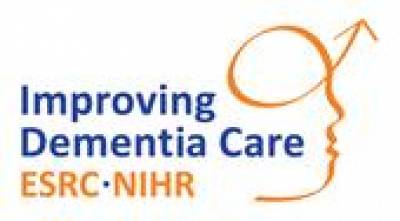
Origins
Nations' Health Ministers met at the G8 Dementia Summit in London in 2013 to discuss how to shape an effective international response to dementia, acknowledging the on-going work occurring in all eight countries, and globally, to identify dementia as a major disease burden and to address issues related to ageing and mental health.
Among the agreements at the summit were a commitment to call for greater innovation, identify a disease-modifying therapy by 2025 and develop cross sector partnerships investing in social impact research.
At this summit the Economic and Social Research Council (ESRC) announced that, along with the National Institute for Health Research (NIHR) it was awarding £20 million to six research projects that will significantly add to understanding of dementia. Amongst other things, the research will look at how to better prevent dementia, and improve the quality of life of those with dementia, and their carers.
UCL was awarded three of the six projects, a total of £9.1m of funding:
- "Promoting Independence in Dementia' (PRIDE)" led by Professor Martin Orrell
- "Managing Agitation and Raising Quality of Life (MARQUE)" Professor Gill Livingston
- "Seeing what they see" Professor Sebastian Crutch
The other awarded projects were:
- "Neighbourhoods and Dementia" Professor John Keady (University of Manchester)
- "IDEAL Project" Professor Linda Clare (Bangor University)
- "MODEM Dementia" Professor Martin Knapp (London School of Economics)
Aims and Objectives
- to identify how social and lifestyle changes may help reduce risk of developing dementia and disability and to better understand the social consequences of dementia.
- to develop and evaluate an effective social intervention to support independence and quality of life for people with early stage dementia and their carers.
Work Packages
PRIDE comprises five work packages:
- Work Package 1
WP1 Longitudinal and economic analysis
The English Longitudinal Study of Aging (ELSA) began in 2002 with 11,391 members aged 50-100 years. The sample is reassessed every two years on a range of cognitive processes and lifestyle and health factors. Emerging findings from the database suggest that dementia risk is positively related to loneliness, while having a number of close relationships and being married later in life is inversely related. Other identified factors associated with increased risk include hearing/vision loss and slower walking speed. Reduction in physical activity after diagnosis is also associated with accelerated cognitive decline and maintaining physical activity may reduce symptom progression in dementia.
- Work Package 2
WP2 Qualitative sociological investigation of the social and personal constructs of dementia
Research already carried out suggests that a diagnosis can be used by people with dementia to inform a process of organising and planning how they and their friends and family can cope, but few studies have actually looked at how this works in "real-world" family and social situations. This work package aims to explore societal attitudes to ageing, cognitive decline, and dementia; to understand the social consequences of referral to memory services, the diagnosis of dementia, and the progression of dementia; and to develop interdisciplinary accounts of dementia and examine social structures which may promote independence in people with mild dementia.
- Work Package 3
WP3 Development and feasibility test of a post-diagnostic intervention
We have coproduced a post-diagnostic intervention package for people with dementia with PPI representatives, drawing on psychological theory (e.g. social learning theory) and evidence, self-management principles, a review of publications on psychological and social interventions in early stage dementia, findings from WP1, and data from WP2. Two versions of the package have been developed; a paper based version and a website version in collaboration with Ayup Digital. The paper-based package has been feasibility tested and preparations are being made to transfer learning and materials to WP4.
- Work Package 4
WP4 Extended randomised feasibility trial of PRIDE intervention
Feedback from WP3 indicates continuing to a full randomised controlled trial as initially planned is not feasible. In order to gather additional information and successfully plan and deliver a full RCT in the future, an expanded stand-alone randomised feasibility trial will be carried out by the Nottingham Clinical Trials Unit (NCTU) for WP4. The trial will include both the paper-based and web-based versions of the package.
- Work Package 5
WP5 Career development and capacity building
WP5 is focused on helping early career researchers and PhD students to develop aiming to equip them with a range of professional skills that will facilitate their future research career ambitions in the field of psychosocial interventions and timely diagnosis in people with dementia. The INTERDEM Academy offers fellowships to PhD students and postdoctoral researchers; a biannual programme of seminars and expert workshops/masterclasses and opportunities for academic writing.
Developing positive psychology outcome measures for people with dementia - Dr Charlotte Stoner
Positive psychology refers to the scientific study of strengths and capabilities that contribute to welling. However, the empirical evaluation of character strengths or positive concepts for people with dementia has previously been limited by a lack of suitable outcome measure. The aim of this PhD thesis was, therefore, to develop psychometrically robust, positive psychology outcome measures for people with dementia. Two measures were developed using a combination of quantitative and qualitative methodology: The Positive Psychology Outcome Measure (PPOM) and the Engagement and Independence in Dementia Questionnaire (EID-Q), and a third was psychometrically validated (Control, Autonomy, Self-realisation and Please Scale; CASP-19). The psychometric properties of each measure in a large scale study (n = 237) were excellent and suggested positive psychology concepts are closely linked to classic concepts such as quality of life. This PhD was completed in September 2017.
Evaluating the implementation of a social intervention to improve independence in dementia - Holly Walton, PhD student
Effective psychosocial interventions to help people with dementia maintain independence are necessary, yet interventions may not be delivered as planned or engaged with. Robust methods are needed to monitor and understand how interventions are implemented (i.e. whether they are delivered as planned and engaged with. This will help us to fully understand the intervention outcomes. This PhD project aimed to: 1) review the measures of fidelity and engagement used in complex, face-to-face health behaviour change interventions, 2) develop and use reliable measures to assess whether PRIDE is delivered as planned and engaged with, 3) understand factors influencing whether PRIDE is delivered as planned and engaged with and 4) use these findings to develop recommendations to improve fidelity of delivery of, and engagement with PRIDE. This research used a combination of observational and self-report methods to monitor fidelity of delivery and engagement. Qualitative interviews with dementia advice workers, people with dementia and supporters were conducted to understand the barriers and facilitators to implementation.
Please email Holly Walton (holly.walton.14@ucl.ac.uk) for more information.
The 'Who to tell, how and when?' Intervention - Jem Bhatt, PhD student
A diagnosis of dementia is life changing. The aim of this project is to support people living with dementia and their supporters who are fearful of disclosing their diagnosis to others. The intervention will be an iterative adaptation of the Honest Open Proud programme. The project is currently at the design phase where we are gathering data from various sources: systematic reviews, public consultation and input from experts by experience. Three work packages will take place over the next two years to help develop and evaluate the 3-session group based intervention.
Please email Jem Bhatt (jemini.bhatt.15@ucl.ac.uk) for more information. This research is funded by Alzheimer's Society and the Economic Social Research Council.
Quality of Primary Care Services and the Impact of Congnitive Function-Thomas Stephens - PhD student
The overall aim of this project is to assist in strengthening community care services to aid in promoting independence for people with dementia and cognitive impairments. Theoretical models of the supply- and demand-side equations impacting quality as a result of cognition have been developed, suggesting an externally modifiable personal demand for quality in an inverted "J" shape, with patients with mild impairments demanding more quality services than the cognitively healthy, but those with severe impairments demanding much less.
The aims for the remainder of the project are to identify and evaluate possible mechanisms involved in the supply- and demand-side equations for quality care and how these are associated with cognitive impairment. These findings will be used to inform possible intervention strategies to improve care quality. Early predictions of the value proposition and cost-effectiveness of these interventions will be estimated, as well as the expected value of conducting a trial to determine their efficacy.
 Close
Close


